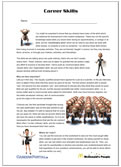What Employers Want
It is important to spend some time understanding what employers are looking for in their employees. Every employer is looking for 3 main things:
- An appropriate level and type of education ('Knowledge requirements')
- Evidence of well developed 'Soft skills'
- As much related experience as possible
1. Knowledge requirements
This refers to the skills learnt through specific educational programmes. This can be general learning, for example a Leaving Certificate, or more specific e.g. An Honours Degree in Architecture.
In many cases, applicants for a particular job will share similar levels of educational achievement, so this alone will not ensure a position.
The educational requirements are almost always specified in a job advertisement so it is important to be fully aware of what is required.
2. Soft Skills
Soft skills are also called transferable skills or career skills. These refer to general employability skills and include such things as communication, problem solving, positive attitudes and behaviours, adaptability, and working with others.
These are skills that employers want you to have, regardless of the type of job and the knowledge base skills (or Hard skills) that a particular job might require.
To the employer, someone who can show that they have these skills will be able to learn and grow in a job, get along with co-workers and will be a long-term asset for their organisation.
The good news is that most job-seekers possess these skills to some extent. The better news is that job-seekers with weaknesses in these areas can improve their skills through training, professional development, or obtaining coaching/mentoring from someone who understands these skills.
|
Where do I start? |
|
| Download: Worksheet - Career Skills Self-Assessment [pdf - 540Kb, 4 pages] |
 |
| Explore Career Skills in detail here |
3. Experience
Employers view previous experience as very significant for a number of reasons:
- If you have experience in a similar role or organisation, you are likely to work effeciently more quickly, as you would require less time to learn what to do and how to do it.
- Significant previous experience suggests you may have developed a good level of competence, and the possibility that you may bring new ways of working to the benefit of the organisation.
- For people entering the workforce early in their career, previous work experience suggests that you would have already some sense of what working life is, and that you have successfully adapted to a business work environment. Employers will seek to find out how closely related your previous experience has been compared to the position they are now offering, and the 'closer the better' is the general rule.
In all cases, employers will look for evidence that you posess the knowledge, skills and experience that you say you have - simply telling them will not suffice! You communicate your knowledge / skills / experience in a number of ways, typically through your CV, the Cover Letter that goes along with it, and any interviews and follow up communications that may arise.
10 Things Sought by Employers |
The following list is typical of the things that an employer will be looking for in many cases:
1. Communication skills - Excellent communication skills are the number one thing that employers and interviewers look for in a candidate. These can be either verbal or written communication skills but you must be able to prove that you can communicate and work alongside others in an excellent manner.
2. Honesty and integrity - This is the 2nd most important thing interviewers and employers look for in a person, so it is worthwhile to remember this during the interview process and make sure that any answers you give to questions you answer honestly as you may be caught out later during the interview if asked the same question in a roundabout way.
3. Teamwork skills - These are another important asset you must have, preferably you will have backed up any claims you make regarding teamwork in your CV with evidence presented during the interview showing and confirming previous experiences you have had with teamwork skills.
4. Interpersonal skills - You must be able to prove your interpersonal skills to the interviewer or employer during the interview, skills such as working alongside others, being able to evaluate and accept responsibility, make team work more efficient and identifying methods used when dealing with conflicts.
5. Strong work ethic - you must be able to prove that you are willing to go beyond the call of duty for your employer and that you are willing to give 100% commitment to the company and the job.
6. Motivation and initiative - You should give examples during your interview to demonstrate that you are willing to show initative and can show motivation when left to your own devices.
7. Flexibility and adaptable - You should be able to give examples from previous positions that show your adaptability to situations that can arise and that show you are able to be flexible and not stuck in a rut.
8. Analytical skills - try to give examples showing off your analytical skills backing up claims with evidence from previous work during the interview, employers and recruiters look for ways that you have been able to analyse and clearly identify problems.
9. Computer skills - With today's modern technology focusing on the use of computers excellent computer skills and understanding of various types of software are essential. Try to prove that you are literate in the use of computers and software in your CV or portfolio.
10. Organisational skills - You will have to prove that you are able to organise in a quick and clear manner and show that you are not afraid to take charge of a situation and find a solution. This again can be shown in your CV with examples from previous jobs.





























